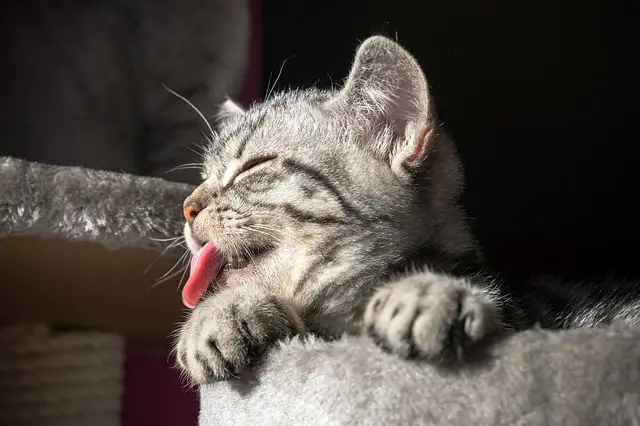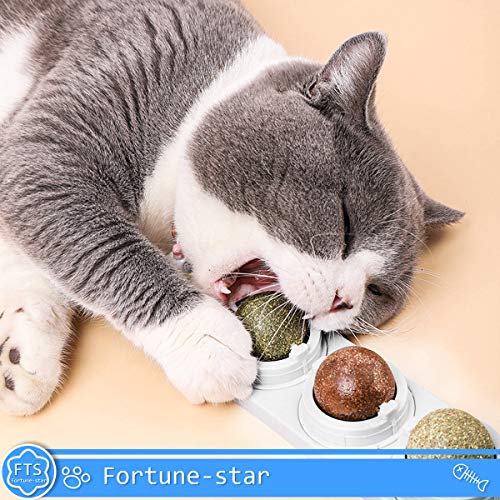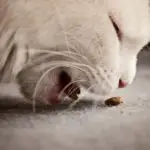‘Why is my cat licking the walls?’ – If you are asking this question too often, then it may be time to see your vet.
You see, there are many causes behind cat’s excessive licking including pica – a common chewing-sucking behavior seen in young cats.
One thing is for sure: you should never overlook your cat’s obsessive licking or scratching behavior – especially if it is licking inedible objects like walls, blankets, rough surfaces, etc. These behaviors often stem from underlying health issues.
In this guide, I will talk about different causes behind ‘why is my cat licking the walls?’ so you can take the right corrective action.
We will also discuss why is my cat licking me so much and why is my cat licking itself.
Also Read: How Does an Indoor Cat Get Worms
Why is My Cat Licking the Walls? Common Causes Behind Excessive Licking in Felines
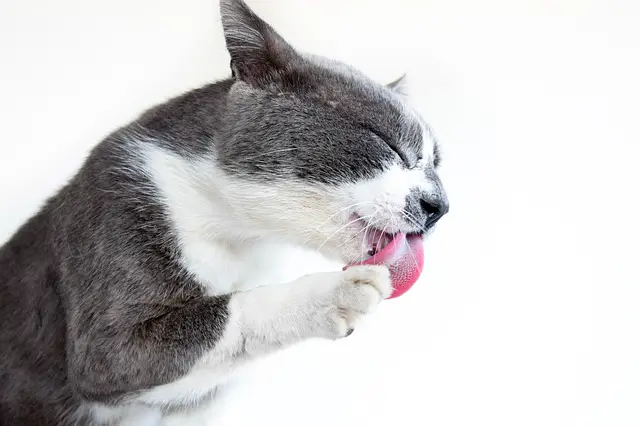
My cat often obsessively licks itself – especially its paws – when I reprimand her for jumping on the counter.
Almost all cats lick – they either lick themselves or some inedible objects. Let us take a look at reasons why your cat might lick non food items.
1. Compulsive disorder
Both people and animals desire a safe and predictable environment and lack of predictability and control can be stressful to them.
Similarly, your cat might indulge in compulsive behaviors when it becomes highly aroused owing to stress and especially when it cannot avoid or control the reason behind the stress.
This resulting behavior then takes on a repetitive pattern designed to soothe and take its mind off that problem.
Therefore, if your cat is licking the walls or other non food items like plastic, wool, wood, etc., then it may be because of obsessive compulsive behavior that stems as a means of coping with stress.
2. Pica
Pica is the name given to cats’ behavior of sucking on non-edible items – especially wool, wood, and walls.
Many young cats up to the age of 6 months display pica – they might even suck on their cat owner dress or clothing while being held.
Other items a cat with pica could chew or lick are rubber, wool, wood, cardboard, and concrete walls.
This type of behavior usually diminishes with age. Until then, you must keep an eye on your pet to ensure it is not at a risk of swallowing the object.
It is believed that genetics also play a role in feline pica – it is more commonly seen in Oriental cats.
3. For attention from owners
Young cats often steal and chew on non food stuff or lick walls when they know it could get them their owner’s attention.
If you continue picking your cat up every time it licks walls, then it will indulge in this repetitive licking behavior. Ignoring the behavior can help.
4. To induce vomiting
Some cats indulge in the unusual habit of wall licking when they have items dislodged in their tummies or have upset stomach or indigestion.
Repeated licking can induce vomiting to help your cat remove previously swallowed items.
5. To relieve oral pain
Some cats tend to lick the walls when they have bad teeth, chewing issue, oral lesions, or dental pain.
Licking might help them create saliva so they get temporary relief from painful issues, sore throat, swallowing trouble, etc.
Also read: Best Soft Dry Cat Food for Cats with Bad Teeth
6. Senility (older cats)
Some cats tend to eat and lick inedible items when they are senile and perceive the non-food items as food items.
7. Nutritional deficiency
If your pet has a nutritional deficiency, then too you might find yourself asking the question ‘why is my cat licking the walls?’ – This is especially due to calcium deficiency.
8. Boredom
Cats might also lick themselves excessively or even lick non food items when they are bored. Such obsessive licking can result in lick granuloma if they constantly lick themselves or even in psychogenic alopecia.
You can prevent this behavior by giving your pet some interactive toys to keep it occupied and prevent destructing licking, chewing, and scratching. A scratching post can also help.
Also Read: Best Motion Activated Cat Toy
9. Something tasty on the wall
If you notice your cat licking the wall suddenly, then you or a guest might have spilled something tasty on it. The tempting substance might have remained even after you cleaned it.
Why is My Cat Licking Me So Much?
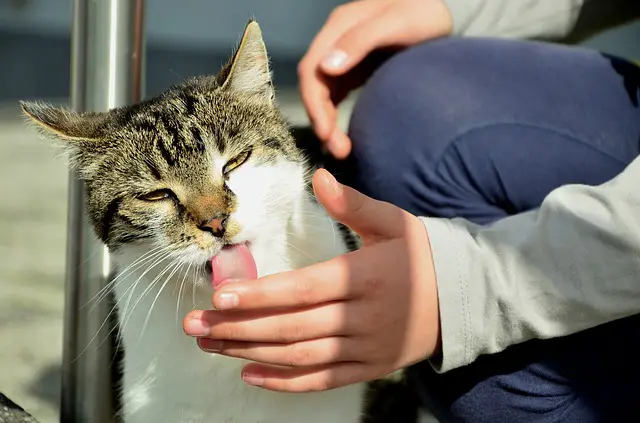
Has your cat always licked you? Then it is just its way of showing affection.
Some cats suddenly start licking their owners due to a medical issue, a psychological problem, or stress.
Here are common reasons why your cat might lick you:
A. To mark their territory
My cousin’s cat often peed on his mom (eww!) because it was his way of saying – this woman is mine! Everyone else –back off!
Yes, cats tend to indulge in excess licking and spraying on their owners when they want to mark them as their property. This is typically seen in cats in multi-cat households.
B. To groom you
Cats and grooming go hand-in-hand. It is an instinct driven behavior which your cat simply cannot help.
In addition to grooming itself, it might lick you as well to groom you.
Sometimes, it might lick and bite you – as if to say – okay, that’s enough now, please stop petting me!
C. To taste what’s on your skin
If your pet starts licking you all of a sudden, then it may be because it wants to taste your food or something interesting you touched recently.
Some cats even lick their owners post-exercise when they are sweaty. After all; cats can taste salt but they cannot taste sugar/sweet.
Also Read: Why Do Cats Like the Smell of Bleach
Why is My Cat Licking Itself So Much?
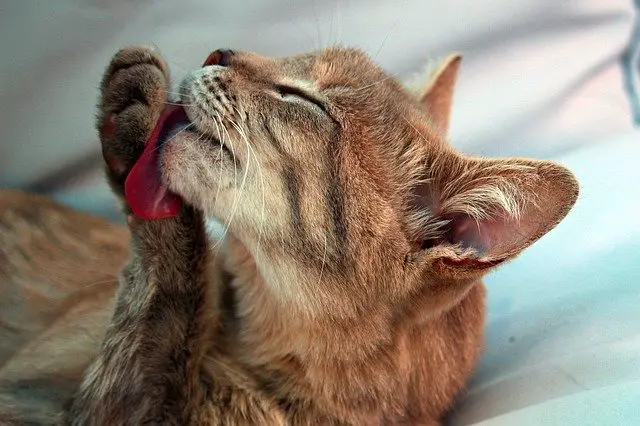
There are numerous reasons behind excessive compulsive grooming in cats.
Most cats are self-groomers, but excess grooming can mean one of the following:
1. Boredom
Like in case of ‘why is my cat licking the walls’, cats could indulge in excess grooming if they are bored. Indoor cats need mental and physical stimulation to prevent boredom.
You could invest in some cat furniture, teething or interactive cat toys, puzzles, obstacle courses, and cat-friendly activities to keep boredom at bay.
Also Read: Best Teething Toys for Kittens
2. Eczema or skin problems
Long-haired cats often have eczema or skin issues which may not be immediately visible under their fur. If your long-haired cat is self-grooming too much, please examine its skin for bites, parasites, eczema, scabies, mites, and hot spots, etc.
Sometimes, a simple shot for allergy or eczema can stop this kind of licking. Don’t forget to brush your cat regularly to prevent skin issues.
3. Displacement gesture
Cat behaviorists state that excess or obsessive self-licking in cats is almost always a displacement gesture.
This means that your cat might be licking the walls or chewing furniture but you might have chided it for doing so.
Resultantly, it has replaced that with this other activity: self-licking. See a vet to eliminate this kind of licking.
4. Anxiety, stress and obsessive disorder
Like with licking walls, excess self-grooming can stem from stress, anxiety, and obsessive compulsive behavior.
Has there been any change in your cat’s routine? Have you moved homes? Is there a new animal – a dog or another cat in the house?
5. Medical issues
An underlying health issue, pain, inflammation, parasites, intestinal worms, food allergies, etc. are also some common reasons behind obsessive compulsive disorder and self-licking behavior. Dietary changes can help show results, although this could take some time.
What Are Some of the Harmful Effects of a Cat’s Excessive Licking?
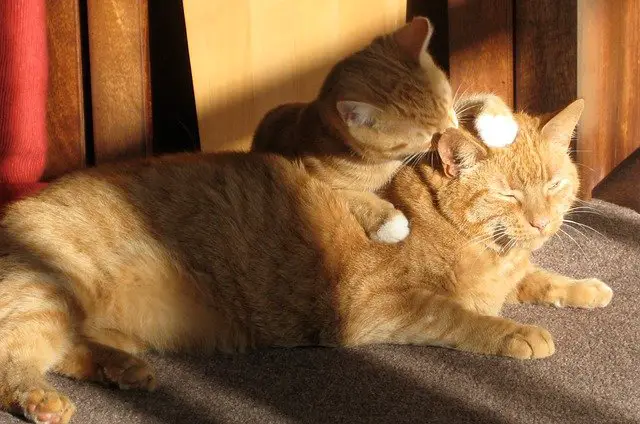
Whether your cat licks the walls or itself, there can be many harmful effects of this behavior:
A. Lick granuloma
Excess self-licking can lead to skin lesions called lick granulomas. Some cats even get multiple lick granulomas. They usually start off as alopecic lesions (bumps with loss of fur) and turn red, itchy, and painful.
Your pet might need corticosteroid shots or creams to treat these granulomas. Many times, these lesions take a long time to heal – nearly 1 to 6 months.
B. Cat licking humans can transmit germs
Cats licking can sometimes be harmful to humans especially if one has a compromised immune system.
A cat licking you on your mouth or nose can transmit many pathogens causing infections and diseases.
C. Cats licking walls can harm your pet in numerous ways
As stated earlier, cats could get an electric shock if they lick the areas near the wall electric outlets.
Also, they could end up swallowing paint from the walls which can be dangerous.
D. Feline leukemia virus
Cats that lick and groom each other often end up transmitting the deadly feline leukemia virus infection. This is characterized by debilitating symptoms like diarrhea, pale gums, eye discharge, lymphoma, breathing troubles, etc.
Treatment and Home Remedies to Eliminate Excess Licking in Cats
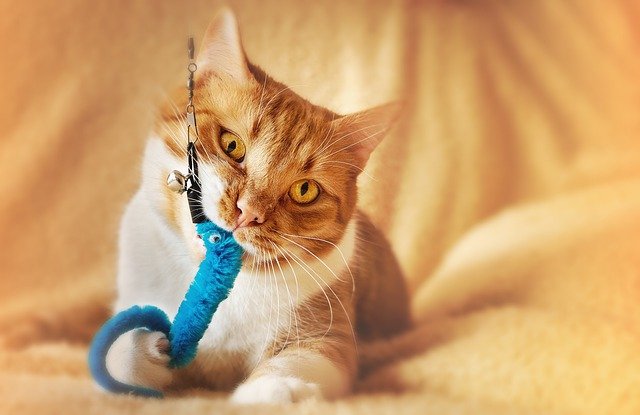
The following are some of the treatment options and home remedies for cat’s excess licking of walls, self-grooming, as well as scratching and chewing behaviors:
1. De-worm your pet and treat it for parasites
Excess chewing, scratching, licking, and other compulsive behaviors can stem from parasites – both internal worms and external ones like fleas and ticks.
Speak to your vet and use a monthly/regular treatment plan for these issues. Get rid of mites, lice, etc. from your pet’s coat through proper grooming and medication.
2. Change its diet and feed it supplements
If you have been asking often ‘why is my cat licking the walls’, then it may be due to dietary deficiencies. See a vet and work out a diet plan for your cat. Sometimes, food allergies could also trigger excess licking.
If your pet has dry skin, then adding omega fatty acid supplements can also help prevent cat’s licking.
3. Use medication
Vets can also prescribe anti-anxiety medicines like clomipramine if the wall-licking stems from anxiety or stress. This can address the psychological issues that often lie at the root of excess licking behavior.
In other cases, antihistamines, as well as antibiotics can show good results too.
4. Address boredom
To keep your cat busy and prevent boredom, use the following tips:
- Provide it with catnip toys. Catnip wall balls can alleviate stress and relax your pet.
- Provide adequate mental and physical stimulation. Take your cat out for a walk.
- Distract your pet when it starts licking the walls – provide it a toy or a treat.
- Bring home another cat – sometimes, a cat may be lonely, and bringing home a companion could help. (Be careful here – sometimes, the addition of a pet can make the licking worse!).
Also Read: Can Cats Eat Mint Leaves
FAQs – Why is My Cat Licking the Walls
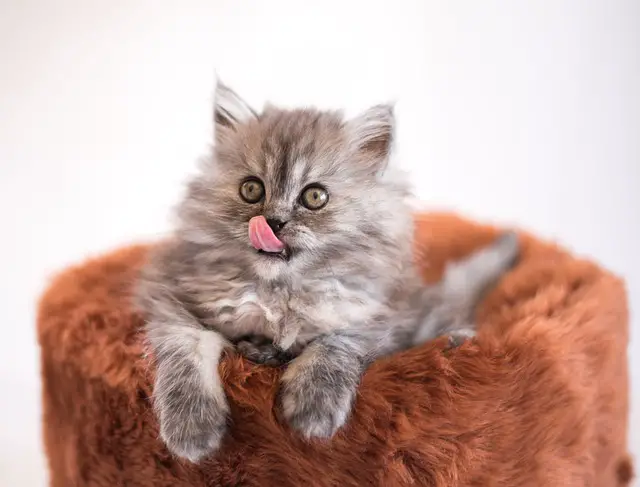
1. How to treat pica in cats?
You can treat pica in cats by removing the objects it licks or covering them with anti-lick spray.
Cat anti lick spray has a bitter-taste which reduces the licking behavior in cats and kittens.
You can also provide your pet with something else to chew and lick – such as a teething toy or catnip licking balls.
2. Why does my cat lick and then bite me?
Cat licking and biting is a way of grooming and bonding with their cat owner. However, if it does this after you pet it, then it may be a sign that it wants you to stop petting.
3. How do I stop my cat from licking blankets?
- Remove the blankets
- Replace them with something else to lick – like catnip toys.
- Provide a safe and secure environment to your cat.
- Provide more physical and mental stimulation to alleviate boredom and stress.
Conclusion
Why is my cat licking the walls?
Cat licking walls can stem from many different causes: pica, stress, anxiety, underlying health issues, nutritional deficiency, something tasty spilled on the walls, and so on.
We hope this guide helps you get to the root of the behavior and also find a permanent solution to stop it.
